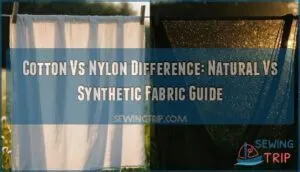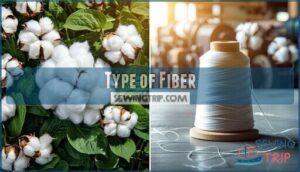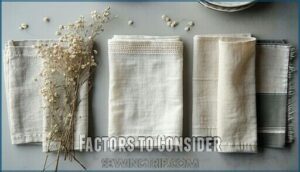This site is supported by our readers. We may earn a commission, at no cost to you, if you purchase through links.

You’ll find cotton breathes better and feels softer against your skin – it’s like that favorite t-shirt that gets comfier with every wash.
Nylon, on the other hand, brings serious durability and water resistance to the table.
Think tactical gear that can take a beating versus cozy pajamas.
Cotton wrinkles easily but won’t irritate sensitive skin, while nylon stays wrinkle-free but might trap moisture.
Each fabric has its sweet spot – cotton for comfort, nylon for performance.
Understanding these trade-offs helps you pick the right material for any situation.
Table Of Contents
Key Takeaways
- You’ll get better breathability with cotton – its natural fibers allow air circulation and absorb moisture, keeping you comfortable in hot weather, while nylon traps heat and feels less breathable against your skin.
- Nylon beats cotton hands-down for durability – it resists tears, won’t shrink or wrinkle, and maintains its shape after thousands of wear cycles, whereas cotton shows wear faster and requires more careful handling.
- Cotton’s your go-to for skin comfort – its hypoallergenic properties make it ideal if you’ve got sensitive skin, while nylon’s synthetic structure can cause irritation and allergic reactions in some people.
- You’ll choose based on your priorities – pick cotton when comfort and breathability matter most (everyday wear, bedding), or select nylon when you need performance and longevity (athletic wear, outdoor gear).
Cotton Vs Nylon: a Comparison
When you’re deciding between cotton and nylon, think of it as picking the right tool for the job.
Cotton, a natural fiber, is like your favorite old t-shirt—soft, breathable, and gentle on your skin.
It’s perfect for those who value comfort and classic fabric choices.
But, cotton can be a bit high-maintenance; it wrinkles easily and shrinks if you’re not careful in the wash.
Nylon, on the other hand, is the powerhouse of synthetic fibers.
It boasts impressive fabric strength and durability, making it a go-to for clothing materials that need to withstand rough use.
However, it doesn’t breathe as well as cotton, so it might feel stuffy in the heat.
Textile science shows nylon resists water and dries quickly, but it’s not biodegradable.
When comparing material properties, ask yourself: Do you want all-day comfort or long-lasting performance?
That’s the real fiber comparison.
What is Cotton?
Cotton stands as nature’s gift to the textile world, offering unmatched comfort and breathability. This natural fiber comes from cotton plants (genus Gossypium), where fluffy white fibers surround the seeds like protective clouds.
Cotton history spans thousands of years – ancient civilizations discovered they could spin these soft fibers into durable fabric. What makes cotton special? Cotton benefits include exceptional absorbency (up to 25 times its weight), natural breathability, and hypoallergenic properties.
Cotton production involves harvesting these seed fibers, then processing them into various cotton fabric types. However, cotton isn’t perfect. It wrinkles easily, shrinks when washed improperly, and shorter fiber staples create weaker threads.
Natural fibers like cotton require gentle care – think of it as high-maintenance but worth the effort. Cotton’s versatility explains why it dominates everything from t-shirts to towels, making it the world’s most beloved natural fiber. The use of sustainable cotton practices reduces environmental harm and promotes eco-friendly textile production.
What is Nylon?
Born from lab experiments in the 1930s, nylon transformed the textile world through its revolutionary synthetic polymer structure.
You’ll discover this man-made fiber through a fascinating polymerization process where chemicals bond to create incredibly strong, elastic strands.
Unlike natural fibers, nylon’s chemical composition gives it superhuman durability – it won’t tear easily and bounces back from stretching.
This synthetic fiber offers remarkable advantages: quick-drying properties, wrinkle resistance, and impressive longevity.
While nylon vs cotton debates continue, nylon material excels in demanding applications like parachutes and athletic wear.
The nylon production process might seem complex, but it delivers consistent quality that natural fibers can’t match.
Think of nylon as the overachiever of synthetic fibers – it’s lightweight yet tough, smooth yet resilient.
From hosiery to industrial applications, this synthetic polymer proves that laboratory innovation can outperform nature’s offerings in specific performance categories.
Difference Between Cotton and Nylon
Understanding these materials starts with recognizing their fundamental differences in origin and performance.
Cotton comes from nature while nylon emerges from chemistry labs, creating distinct characteristics that affect how each fabric behaves in your daily life, based on their performance.
Nature’s softness meets lab-engineered strength—choose your textile superpower wisely.
Type of Fiber
Understanding fiber types helps you make smarter textile choices for your specific needs.
When comparing cotton versus nylon, you’re looking at nature’s softness against synthetic strength.
Fiber Sources and Production
Cotton comes from natural fiber sources – specifically the fluffy white bolls of cotton plants.
These natural fibers grow in fields across India, China, and the United States.
Meanwhile, nylon starts its journey in chemical laboratories through synthetic fiber production using petrochemicals and polymerization processes.
Key Fiber Characteristics
- Natural fiber: Cotton offers superior breathability and skin-friendly comfort
- Synthetic fiber: Nylon provides exceptional durability and wrinkle resistance
- Fiber production: Cotton requires harvesting; nylon needs chemical manufacturing
- Textile science: Natural fibers absorb moisture; synthetic materials repel it
- Performance: Cotton excels in comfort applications; nylon dominates strength requirements
- Applications: Cotton suits everyday wear; nylon handles industrial demands
This fundamental difference in synthetic materials versus natural fibers determines everything from how they feel against your skin to their environmental impact.
Origins
These two materials trace back to completely different worlds.
Cotton emerges from plant origins through centuries of cotton history, where farmers harvest soft fibers from Gossypium plants.
This natural fiber grows in fields across India, China, and America.
Meanwhile, nylon represents modern synthetic creation born in 1930s laboratories.
Scientists developed this synthetic polymer through material development using petrochemicals and polymerization processes.
Textile manufacturing now relies on both – one from earth’s bounty, the other from human ingenuity.
| Aspect | Cotton | Nylon |
|---|---|---|
| Source | Cotton plant (Gossypium) | Laboratory-made chemicals |
| Timeline | Ancient civilizations | 1930s invention |
| Production | Agricultural harvesting | Chemical polymerization |
| Development | Natural evolution | Human engineering |
Wrinkles and Creases
Looking at fabric care can feel like traversing a laundry minefield, but understanding wrinkle resistance makes the difference between crisp clothes and crumpled chaos.
- Cotton wrinkles easily due to natural fiber structure, requiring frequent ironing and careful fabric care
- Nylon resists wrinkles naturally, maintaining fabric smoothness with minimal crease removal needed
- Shrinkage patterns differ – cotton shrinks while nylon maintains size, affecting long-term fabric relaxation
Smart ironing tips help cotton last longer, but nylon’s built-in wrinkle resistance saves time.
Durability
Wrinkles and creases can be annoying, but in the context of fabric durability, you want something that stands up to real life.
If you’re looking for fabric longevity, nylon is the heavyweight champion. It boasts outstanding wear resistance and tear strength, shrugging off daily abuse that would leave cotton looking tired and worn.
Cotton, while soft and breathable, is more like a favorite old T-shirt—comfortable but quick to show its age through rips, fading, and material degradation.
- Nylon: High fiber durability, superior abrasion resistance, and color that stays bold wash after wash.
- Cotton: Moderate tear resistance, prone to fading and thinning, especially with frequent use.
Nylon’s strength and resilience mean it keeps its shape and integrity for years. Cotton can last, but it’ll need extra care and will eventually break down faster.
For sheer fabric durability, nylon takes the prize. Understanding material strength comparisons is vital for making informed decisions about fabric choice.
Skin Irritations
Many people don’t realize that cotton’s hypoallergenic properties make it a skin-friendly champion.
Clinical trials show cotton causes zero irritation responses, even on sensitive skin.
Nylon’s synthetic nature can trigger allergic reactions, skin rashes, and mechanical irritation from friction.
Cotton’s breathability prevents sweat buildup that causes itch relief needs, while nylon traps moisture, promoting bacterial growth.
For those with skin sensitivity or allergies, cotton’s natural fibers provide superior skin absorption and comfort. The study confirms cotton’s hypoallergenic benefits are ideal for sensitive skin types, highlighting its natural fibers and skin-friendly characteristics as key advantages, with superior skin absorption being a notable benefit.
Cotton: Natural Comfort
Cotton brings together the best of nature’s comfort through its breathable fibers and gentle touch.
Cotton’s gentle fibers wrap you in nature’s own embrace, breathing with your every move.
You’ll find this natural fiber offers unmatched softness levels that synthetic materials simply can’t replicate.
Cotton’s hypoallergenic properties make it perfect for sensitive skin, while its natural fibers allow air to flow freely around your body.
Here are cotton’s key comfort properties:
- Breathability Factors – Cotton fibers naturally wick moisture away from your skin, keeping you cool and dry throughout the day
- Superior Softness – The natural fiber structure creates a gentle, smooth texture that feels comfortable against bare skin
- Skin Benefits – Hypoallergenic qualities reduce irritation and allergic reactions, making cotton ideal for people with sensitive skin
- Temperature Regulation – Cotton’s breathability helps maintain ideal body temperature in various weather conditions
This natural fiber’s comfort properties have made it the go-to choice for everything from everyday t-shirts to luxury bedding for centuries.
The quality of cotton fabrics is often determined by the type of cotton fabric materials used in their production.
Nylon: Synthetic Strength
While cotton offers natural comfort, nylon’s synthetic polymers deliver unmatched performance.
Nylon fabrication creates molecular bonds that you can’t get with natural fibers.
This synthetic material boasts fiber strength that’s genuinely impressive—think parachutes holding skydivers or climbing ropes supporting your weekend adventures.
Chemical resistance sets nylon apart from cotton in harsh environments.
You’ll find it resists oils, acids, and UV damage that would quickly degrade natural fibers.
Material durability means your nylon gear lasts years longer than cotton alternatives.
The nylon advantages become clear in demanding applications.
When comparing nylon vs cotton for strength, synthetic materials consistently outperform.
Your athletic wear stretches without tearing, backpack straps handle heavy loads, and swimwear maintains shape after countless pool sessions.
This durability explains why manufacturers choose nylon for high-stress applications where cotton simply can’t compete.
The production of nylon fabric often involves understanding nylon fabric properties to optimize its use in various products.
Key Differences Between Cotton and Nylon
Understanding the cotton vs nylon difference starts with recognizing their fundamental Material Origins. Cotton’s natural fiber comes from plant seeds, while nylon’s synthetic polymer originates from petrochemicals. This core distinction drives everything else.
Fabric Strength clearly favors nylon – it’s engineered for durability and won’t stretch out of shape like cotton does. Cotton’s softer fibers feel gentle but lack nylon’s resilience. You’ll find cotton shirts losing their form after multiple washes, while nylon maintains its original fit.
Breathability Factors heavily favor cotton’s loose weave structure. Natural fiber allows air circulation, keeping you comfortable in warm weather. Nylon’s tight synthetic construction traps heat, making it less ideal for casual wear.
Textile Properties reveal nylon advantages in moisture management – it wicks sweat away efficiently. Cotton absorbs moisture instead, which can feel heavy and uncomfortable during physical activity. For Fiber Comparison purposes, choose cotton for everyday comfort or nylon when performance matters most. When considering synthetic fabrics, nylon is often compared to polyester regarding fabric strength differences.
Factors to Consider
Choosing between cotton vs nylon isn’t just about preference—it’s about matching fabric properties to your specific needs.
When selecting materials, you’ll want to evaluate several critical performance metrics that directly impact your satisfaction and garment longevity.
Consider these essential factors:
- Breathability – Cotton’s superior airflow prevents overheating, while nylon traps heat
- Durability – Nylon withstands 2,000+ wear cycles versus cotton’s 500-cycle limit
- Moisture absorption – Cotton absorbs 27 times its weight; nylon wicks but doesn’t absorb
- Care instructions – Cotton requires careful washing to prevent shrinkage; nylon needs minimal maintenance
- Environmental impact – Cotton biodegrades in months; nylon persists for decades
Your fabric choice depends on intended use.
For daily comfort and breathability, cotton excels.
For athletic performance and durability, nylon wins.
Material costs vary—nylon’s higher upfront price often balances against longer lifespan.
Consider your skin sensitivity too, as nylon causes irritation in 15% of users versus cotton’s 2%.
Cotton Versus Nylon: Know Your Textiles
When selecting fabrics for your next project, you’ll want to understand how cotton vs nylon performs in real-world applications. These materials couldn’t be more different in their fiber technology and material properties.
Cotton fabric offers unmatched breathability and natural comfort. Its porous structure allows air circulation, making it perfect for everyday clothing choices. However, this natural fiber demands more attention in fabric care – expect wrinkles and potential shrinkage.
Nylon vs cotton reveals a trade-off between comfort and performance. Nylon’s synthetic construction delivers superior durability and wrinkle resistance, but sacrifices the soft feel you get with natural fibers. It’s like choosing between a comfy couch and a sturdy backpack.
Understanding textile science helps you make smarter clothing choices. Cotton excels in casual wear where comfort matters most. Nylon shines in activewear and technical applications. Your lifestyle determines which wins this material properties showdown.
Frequently Asked Questions (FAQs)
Which is better, nylon or cotton?
Neither’s universally better—you’ll need the right fiber for your specific application.
Cotton excels in comfort and breathability for everyday wear, while nylon dominates in durability and performance for demanding uses.
What are the advantages of nylon over cotton?
Nylon’s got you covered with superior strength, durability, and tear resistance. It won’t shrink, wrinkle, or fade like cotton does. Plus, it’s mildew-resistant and dries quickly after washing.
Is nylon or cotton better for sweat?
When you’re swimming in sweat, cotton becomes a soggy sponge that clings uncomfortably.
Nylon’s your best bet—it wicks moisture away from skin and dries lightning-fast, keeping you cooler during intense workouts, with nylon being the key to comfort.
What are the disadvantages of nylon?
You’ll find nylon’s biggest drawbacks revolve around comfort and environmental impact. It traps heat, doesn’t breathe well, and can feel clammy during workouts. Plus, it’s not eco-friendly.
Which is more flexible – cotton or nylon?
Like choosing between a rubber band and rope, you’ll find nylon’s the clear winner for flexibility.
Its synthetic polymer structure gives it superior stretch and elastic recovery compared to cotton’s rigid natural fibers.
Is cotton or nylon more suited for athletic clothing?
Nylon’s your athletic champion. It wicks moisture away, dries quickly, and won’t lose shape during intense workouts. Cotton absorbs sweat like a sponge, staying damp and heavy.
How do cotton and nylon compare in terms of environmental impact?
Despite thinking they’re equally eco-friendly, cotton actually beats nylon environmentally. You’ll find cotton biodegrades naturally while nylon persists for decades, releasing microplastics. Cotton’s renewable; nylon requires fossil fuels.
Which fiber type is easier to dye – cotton or nylon?
Cotton takes dye like a thirsty sponge, absorbing colors beautifully and permanently. Nylon’s synthetic fibers resist traditional dyes, requiring special acid dyes and higher temperatures for decent color uptake.
What are some common applications where cotton would be preferred over nylon?
You’ll choose cotton for everyday clothing, bedding, towels, and undergarments where breathability, softness, and moisture absorption matter most. Cotton’s comfort against skin beats nylon’s synthetic feel.
Which fabric is better for hot weather?
Cotton absorbs 25 times its weight in water, making it your go-to choice for hot weather. You’ll stay cooler since cotton’s breathable and wicks moisture away, while nylon traps heat.
Conclusion
Picture medieval knights swapping chain mail for performance gear – that’s basically the cotton vs nylon difference in modern terms.
You’re choosing between natural comfort and synthetic strength.
Cotton offers breathability and skin-friendly softness, perfect for everyday wear and sensitive skin.
Nylon delivers superior durability, water resistance, and wrinkle-free convenience for active lifestyles.
Your decision depends on priorities: comfort versus performance, breathability versus durability.
Understanding these trade-offs guarantees you’ll select the right fabric for every situation you encounter.

















